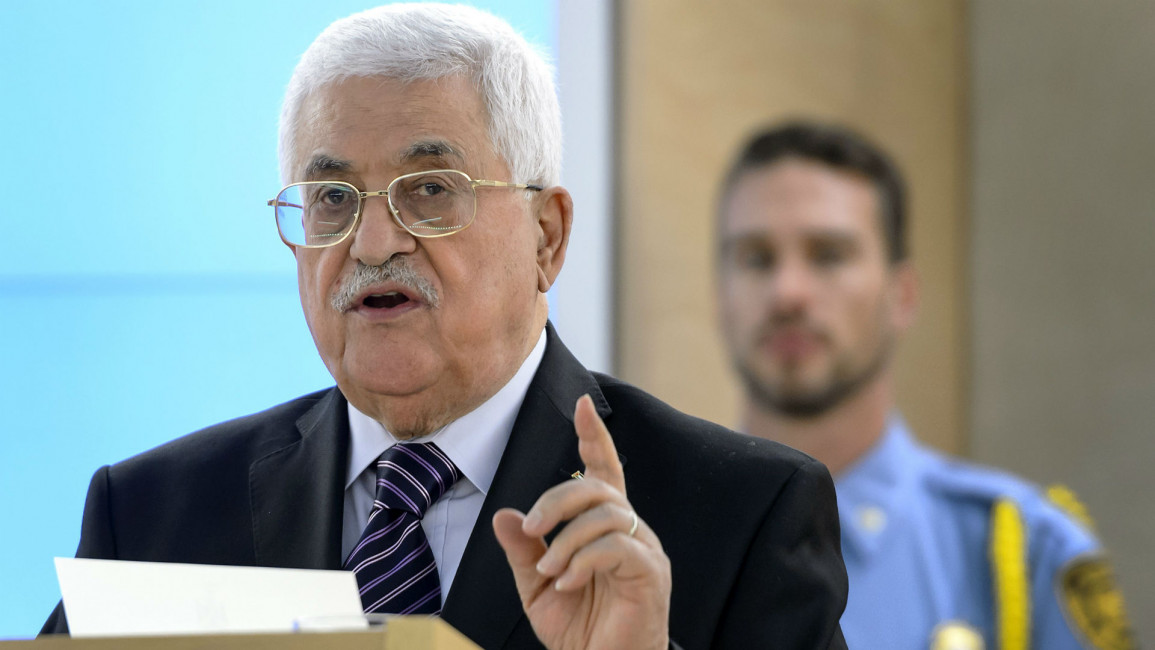Abbas calls for 'international protection regime' for Palestinians
Palestinian president Mahmud Abbas called Wednesday for the creation of a "special regime" for the protection of his people, as a wave of deadly Israeli-Palestinian violence showed no sign of abating.
Abbas called on the United Nations, "more urgently than any time before, to set up a special regime for international protection for the Palestinian people, immediately and urgently."
Accusing Israel of carrying out "extrajudicial killings", he called for the United Nations, and especially the Security Council, as well as member states to shoulder their responsibility.
"We need protection, and we look to you," he told a special meeting of the UN Human Rights Council on the escalating crisis.
"Protect us. Protect us. We need you," he said, warning that allowing the current situation to continue would "kill the last shred of hope for the two-state-solution-based peace."
The United Nations also warned Wednesday that a deadly surge in violence between Israelis and Palestinians was headed toward "catastrophe" as fresh protests were expected in the volatile West Bank.
| We need protection, and we look to you. - Abbas addressing the UN Human Rights Council. |
A wave of anger has gripped the city of Hebron where hundreds demonstrated Tuesday night to demand the return of "the bodies of martyrs" - youths behind a wave of unrest that has seen nine Israelis killed in knife attacks and shootings.
Withholding the bodies of attackers is one of a series of measures approved by the Israeli government to try to dissuade the attacks against Jews, which began in early October as tensions over the Al-Aqsa mosque compound in Jerusalem boiled over.
UN High Commissioner for Human Rights Zeid Ra'ad Al Hussein warned that the latest flare-up in violence in the six-decade-old conflict was "dangerous in the extreme".
"The violence between Palestinians and the Israelis will draw us ever closer to a catastrophe if not stopped immediately," he said during a meeting of the UN Human Rights Council in Geneva.
The special one-hour meeting of the United Nations' top rights body was a rare event, with only a single precedent: when Chilean President Michelle Bachelet spoke to the council in 2007.
Clashes erupted in September as an increase in Jewish visitors to Jerusalem's Al-Aqsa mosque compound alarmed Palestinians, who fear Israel is seeking to change rules that forbid Jews from praying there.
Israeli Prime Minister Benjamin Netanyahu has repeatedly denied such claims.
Clashes there spiralled into a wave of stabbings and shootings that have left nine Israelis dead since October 1. Fifty-nine Palestinians - around half of them attackers - and one Israeli Arab have also been killed.
And an Israeli Jew and an Eritrean have also been killed after being mistaken for attackers.
Abbas on Wednesday accused the Israelis of acting "as a state above international law," and said it has "recently stepped up its criminal practices to the point where it performed extrajudicial killings of defenceless Palestinian civilians, (and) detained their corpses, including children."
The surge in violence has prompted an intense diplomatic drive to douse tensions that many fear herald a third Palestinian intifada, or uprising, like those of 1987-93 and 2000-05, when thousands were killed in near-daily violence.
Abbas warned Wednesday that "it is no longer useful to waste time in negotiations."
"What is required is the ending of occupation," he said, insisting that was "the root" of the problems plaguing Palestinians and Israelis alike.
He called on the international community to help "stop these daily crimes committed against my people" and "protect Israel from itself."
On Tuesday, the Palestinian cabinet held a meeting in Ramallah and called on the international community to set a timetable to end the Israeli occupation, remove settlements, and resolve the final-status issues.
They focused on issues concerning refugees, releasing prisoners, the treatment of prisoners of war based on international law and agreements, and the establishment of an independent Palestinian state with Jerusalem as its capital.
The cabinet also warned of a plot by Netanyahu to revoke the residencies of nearly 100 thousand Jerusalemites living in neighbourhoods that are beyond the seperation wall built by Israel in the West Bank.



